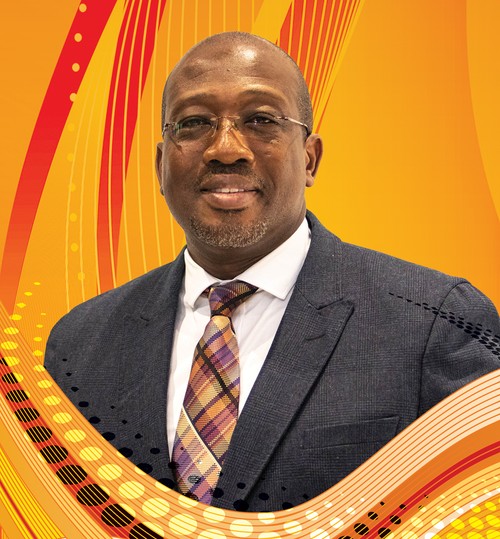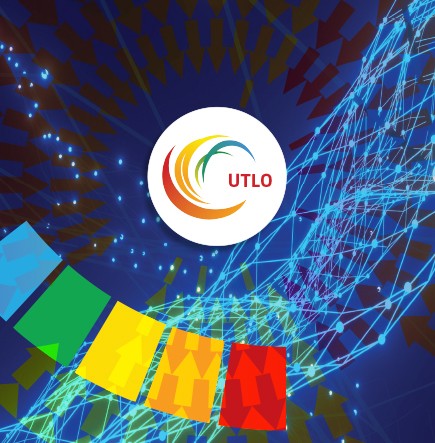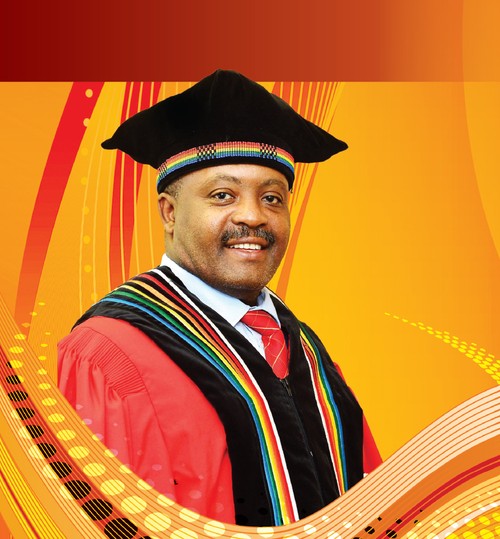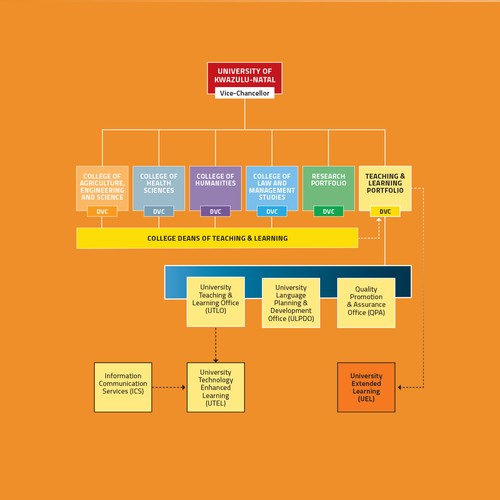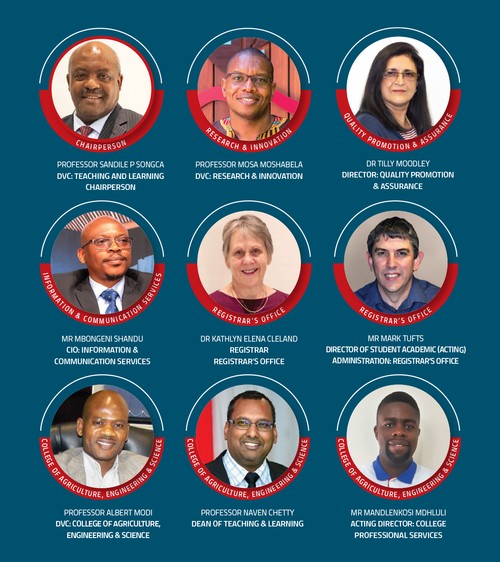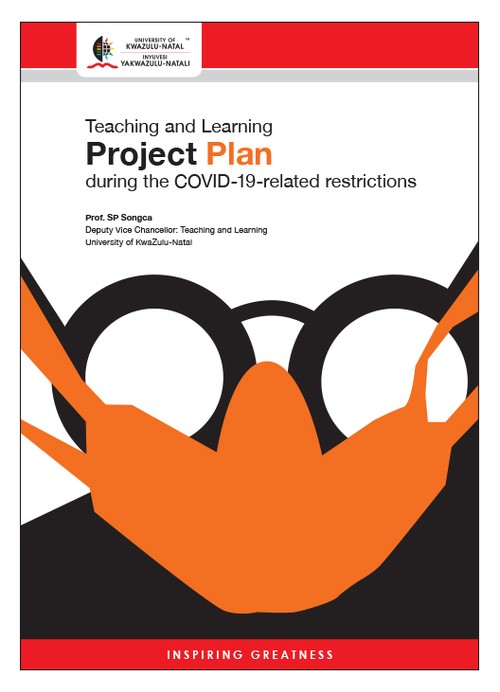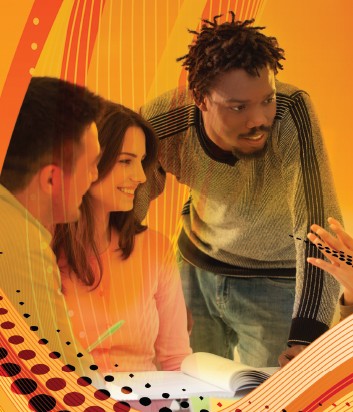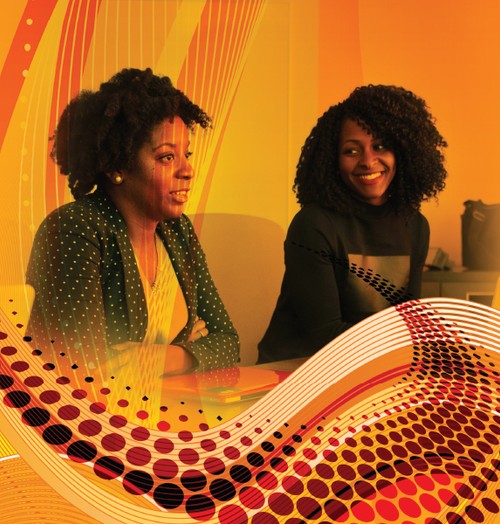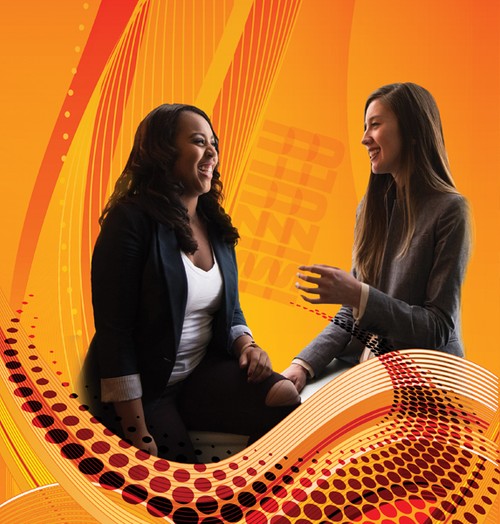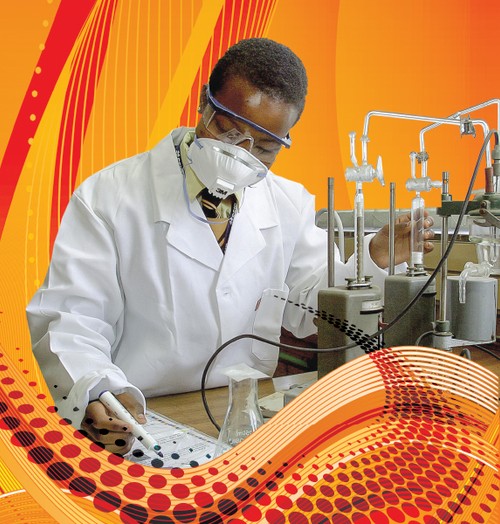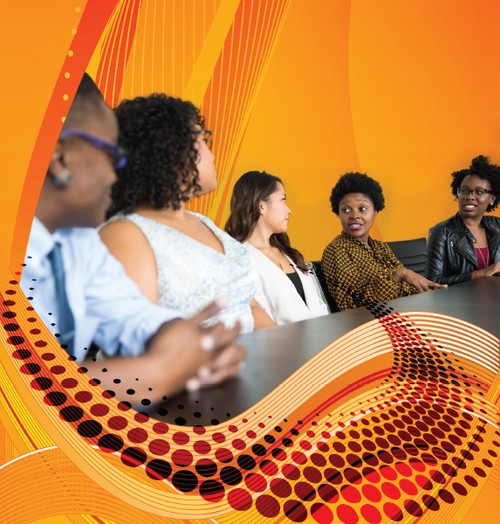The College of Health Sciences (CHS) is spread across UKZN’s five campuses and strives to foster socially responsible scholars that engage actively in education, research and service within an African health environment.
This report covers the period when the College, like those in other universities with clinical programmes in South Africa and globally, confronted COVID-19 related challenges in teaching and learning. These challenges were most apparent in delivering clinically focused programmes that require experiential learning in healthcare facilities, including hospitals and clinics, which were epicentres to combat the COVID-19 pandemic. Students’ sudden withdrawal from clinical placements in response to the national lockdown had a significant impact on experiential learning for health sciences in clinical rotations.
The CHS developed several strategies to enhance safety for students and staff engaged in clinical teaching and learning. The College Teaching and Learning Committee, including the Dean of Teaching and Learning, Professor Duma, the Academic Leaders of Teaching and Learning in the four Schools, Drs Diane Van Staden (SHS), Pamela Pillay (LMMS), Munira Motala and Mergan Naidoo, Mrs Ranitha Ramdeyal (College Academic Manager) Dr Saloschini Pillay (Manager for Student Support Services) and Mr Sabelo Mhlongo (QPA Consultant for CHS) worked non-stop to ensure the smooth transition of all taught modules from traditional to remote online teaching for blended learning that was adopted by the UKZN Teaching and Learning Task Team, to ensure the quality of remote teaching and learning programmes and the integrity of online assessments. They ensured that the College participated in all quality control procedures, including the dry-run of all remote teaching and activities and assessments and capacity development to improve staff’s online teaching skills while ensuring that ‘No student and academic staff member was left behind’.
Several measures were put in place to ensure continuity of experiential learning and clinical teaching and learning during the national lockdown and closure of the University. The College liaised with health professional boards to allow for increased simulation for clinical teaching, sophisticated software licences were purchased to enhance online teaching and learning of clinical skills by students and staff, and senior students in laboratory and clinical programmes returned early for clinical teaching in decentralised clinical settings and University simulation laboratories. These measures necessitated the development of a series of training workshops for students and academic and support staff on keeping safe from infection with the virus, the principles of infection control, and protocols to prevent the spread of COVID-19 in on-campus simulations laboratories in clinical settings. A pioneering measure was the establishment of a COVID-19 response team and Campus Health “War Room” in March 2020 that was spearheaded by (Acting) Deputy Vice-Chancellor of Research and Innovation Professor Mosa Moshabela and Deputy Vice-Chancellor and Head of the College of Health Sciences, Professor Busisiwe Ncama.
Hashtags and a hotline were established to communicate with the University community about the virus. Leaflets on the symptoms of the virus and where to get help were circulated among staff and students. Professor Ncama led large-scale high-level surveillance, prevention and response measures which included a high impact awareness campaign and a fully-trained team to work closely with the health authorities and the government to manage symptomatic persons and track those who had contact with them for COVID-19 screening. The UKZN COVID-19 team members included Dr Velile Ngidi, Public Health Medicine Registrar; Dr Richard Lessells, Infectious Disease Specialist; Dr Saajida Mahomed, Public Health Medicine Specialist; Dr Lilishia Gounder, Clinical Virologist; Dr Nokukhanya Msomi, Head of Virology; Dr Saloshni Naidoo, Head of Public Health Medicine; Professor Yunus Moosa, Infectious Diseases; Dr Nithendra Manickchund, Infectious Diseases; Mr Muzi Mthembu, Campus Health Services; Ms Nozipho Jali, Campus Health Services, Ms Gugu Zondi, Campus Health Services; Ms Gugulethu Mdunge, Campus Health Services; Ms Jabu Hlophe, Campus Health Services; Ms Jane Taylor, Campus Health Services; Mr Sandile Nzuza, Information Systems; and Ms Normah Zondo, Corporate Relations.
Academic Monitoring and Student Support During the National Lockdown and University Closure
The CHS is the only College with full-time ADOs. In 2020-2021, they played a crucial role in tracing students who were off campus to ensure that all students were accounted for and receiving the necessary academic support during remote learning after the national lockdown and University closure. The ADOs were vital in reaching out to all students in the Vice-Chancellor’s M+ Project as they were reconnected with their different programmes and were provided with the necessary academic assistance. This reduced the number of M+ Project students identified by the Institutional Intelligence Office in 2019 from 115 to none by the end of Semester 1 2021. The ADOs also helped to ensure that students in the decentralised clinical teaching sites received the necessary personal protective equipment (PPE) and were safe during their clinical teaching.
To enhance their skills in academic development and support for students, 11 ADOs were sponsored to register for a short online course on academic development through UNISA in 2021. This initiative was funded by the UCDP as per the approved UCDP plan 2021-2023. They have since graduated and are using these skills to advance academic student support in CHS. Ms Mandisa Ndawonde, ADO of the School of Clinical Medicine (SCM) praised the course: “The course work material was fun to work on, and we enjoyed engaging the material. It gave us more insights into the work we currently do.” Ms Cassandra Odelle Subiah, ADO of the School of Laboratory Medicine and Medical Sciences (SLMMS) concurred: “The course material was very interesting and gave good insight into various aspects of student risk and subsequent support. The knowledge we gained from the course could be incorporated into how we work as ADOs.”
Exit Orientation to the World of Work for Health Sciences Graduates
The CHS’ Student Support Services (SSS) team held an Exit Orientation and Graduate Recruitment workshop to prepare final-year students for the world of work. The programme featured a variety of professionals, including healthcare workers and medical and human resources specialists. Students were advised to continue being lifelong learners, adhere to ethical codes, protect the public through the regulations of statutory bodies, live within their means, develop line management skills, live healthily during the pandemic and be a good digital citizen. Issues relating to image and branding in the workplace were also discussed. Student counsellor Ms Suzanne Stokes conducted a survey after the session. “Almost all the students reported that the programme had made quite an impact on their journey as future healthcare practitioners,’ she said. “The majority felt it had been relevant and of value and benefit, with 100% recommending the exit orientation and graduate recruitment programme to colleagues.”
Blended Integrated Student Support and Engagement for Sustainable Academic Success and Holistic Student Wellness
This Kresge funded project through the UTLO seeks to address poor student engagement with student support services in CHS. Student protests, COVID-19 related lockdowns, and poor access to SSS present challenges to students’ academic success. For instance, the CHS Student Engagement and Student Success Impact Evaluation Report (2013-2017) revealed that 33% of all students who were academically excluded during that period had not completed the SWAT assessment and that 66% of students failed to use the wellness interventions developed and implemented by SSS. The report highlights the need for the proposed technology-enhanced approach to blended student engagement and support. It was observed that the current traditional methods used to implement the SWAT programme encounter challenges related to access, making it difficult to assess its impact on student success; hence the proposed project. The need to align the programme to remote teaching and the blended learning approach adopted by UKZN in 2020 was the impetus for this project. The project team includes Professor Sinegugu Duma, CHS, Project Leader; Dr Samukelisiwe Khumalo, College of Humanities, Co-Researcher; Mr Mbongeni Shandu, ICS, Co-Researcher; Dr Saloschini Pillay, CHS SSS Manager, Co-Researcher; Ms Suzanne Stokes, CHS SSS Counsellor, Co-Researcher and Mrs Wulganithi Thaver. The technology enhancing student engagement project will be piloted with Bachelor of Nursing first-year students in 2022. The data and results of this project are much anticipated and will be reported at a later date.
Staff Development in Teaching and Learning
Despite the COVID-19-related challenges in T & L, there were a number of positive outcomes in T & L staffing. Professor Shenuka Singh who received the Distinguished Teachers’ Award in 2018 was promoted to full professor. She attended the LIFE2020 (Lapland International Forum for Education) at the University of Lapland, Rovaniemi, Finland in February 2020 and has since joined the College Teaching and Learning Committee as an Academic Leader of T & L for SHS. The Committee is already benefiting from her contributions though the capacity development workshops she offers to other members of the Committee, SHS and the CHS at large.
Professor Singh has also been nominated for the Teaching Advancement in Universities fellowship where she will continue advancing the collaborative project between ITS, SSS and the College Teaching and Learning Project under the leadership of the Dean of Teaching and Learning Professor S Duma on the development of technology enhanced student engagement for sustainable academic success covered elsewhere in this report.
Curriculum Development and Transformation for Healthcare in the 21st century
In the past two years, the CHS completed curriculum development and transformation of several new programmes that went through both internal and national approval and accreditation processes.
The new Bachelor of Medical Science, Innovation and Entrepreneurship (NQF Level 8) developed by the School of Laboratory Medicine & Medical Sciences (SLMMS), was approved by Senate and Council late in 2021 and has since received clearance for Programme and Qualification Mix (PQM) by the DHET. This is a critical step for the new programme to be submitted to the CHE. The School of Nursing and Public Health received both CHE and South African Nursing Council approval for several programmes, including the new Bachelor of Nursing, Postgraduate Diploma in Health Service Management and Postgraduate Diploma in Midwifery.
Compliance with the requirements of the CHE and health professional boards, including the South African Nursing Council and Health Professionals Council of South Africa is critical for the integrity of all CHS clinical and non-clinical programmes and provides assurance to the public of the quality of the College’s programmes. Achievement of these curriculum development and transformation activities by College staff working remotely attests to how well the CHS has adapted to achieve the University’s goals despite the challenges brought about by UKZN’s closure in response to the national lockdown from March 2020.
Digitalisation of the Curriculum
In partnership with UTEL, the CHS produced 121 teaching and learning videos, podcasts, and YouTube videos for different programmes towards the achievement of the UCDP-approved goal of digitalisation of the curriculum by the end of 2021. This includes the series of YouTube videos launched by Dr Diane van Staden on Conversations in Health Sciences discussed later in this report. In addition, in partnership with UTLO, the CHS embarked on appointing a College-based Instructional Designer and capacity development of academics towards achieving digitalisation of the curriculum. One staff member, Dr S Ebrahim registered for the Instructional Designer Programme offered by the University of Pretoria (UP) in 2021 to develop skills for Instructional Design at CHS. Several academics attended Active Connected Teaching, a technology-enriched, active pedagogy programme as part of capacity development towards the digitalisation of the curriculum.
Communities of Practice in Teaching and Learning Scholarship
The College PR Office assisted the College Teaching and Learning Office and the Schools to organise numerous webinars to promote Communities of Practice presentations in 2020 and 2021. Because these presentations were held virtually, it was easier for many academic staff members, including those in the clinical services across the province to participate and share knowledge, expertise, and best practices with their national and international counterparts without leaving their homes, offices or clinical services. Some meetings were held after hours, allowing many clinical staff members and postgraduate students to benefit. Webinars held in 2020-2021 included:
Strengthening the Workforce to Improve Treatment and Care of HIV (SWITCH) project
The Clinical Care Management for Sexual and Gender Diverse Communities workshop was held on from 16 to 17 September 2021. The seminar was part of the lesbian, gay, bisexual, transgender, queer and intersex (LGBTQI) work package in the SWITCH project, a Health Resources and Services Administration (HRSA)-funded pilot initiative awarded to UKZN in 2019.
Speaking at a two-day Clinical Care Management for Sexual and Gender Diverse Communities workshop attended by various health professionals, Deputy Vice-Chancellor and Head of the CHS Professor Busi Ncama noted that LGBTQI persons face various obstacles in accessing many of their rights, including the right to basic healthcare. “Many LGBTQI people struggle to find healthcare providers knowledgeable about their needs and encounter discrimination from insurers or providers, which delays or nullifies care because of concerns about how they (LGBTQI people) will be treated. It is essential for us as health professionals to ensure we provide competent care for all our patients.”
Lead facilitator of the workshop Dr ZamaSomi Luvuno said the event aimed to strengthen LGBTQI content in the College by using quality improvement processes to assist students to develop an understanding of related health issues and skills in the care of LGBTQI patients. Various issues were discussed, including the impact of cultural and religious beliefs and sexuality in South Africa, the depth of understanding of basic terminology used in LGBTIQA+ communities, and appropriate use of terminology in healthcare delivery.
 Above: Members of the LGBTQI work package in the SWITCH project. From left: Dr Makhosi Dube, KwaZulu-Natal Nursing College; Professor Fikile Mtshali, UKZN, Ms Qhawe Thengwa, Beyond Zero; Professor Orlando Harris, University of California; and Dr Zamasomi Luvuno.
Above: Members of the LGBTQI work package in the SWITCH project. From left: Dr Makhosi Dube, KwaZulu-Natal Nursing College; Professor Fikile Mtshali, UKZN, Ms Qhawe Thengwa, Beyond Zero; Professor Orlando Harris, University of California; and Dr Zamasomi Luvuno.
The goal was to heighten awareness of the health needs of transgender women, and bisexual and homosexual men, with a focus on sexual health as well as recognition of the underlying prejudice toward sexual and gender minorities, including provider bias. There were also discussions on sexual practices and safer sexual practices. Professor Orlando Harris of the University of California in the United States demonstrated how to obtain a comprehensive sexual history using the 5 Ps framework, STI diagnosis and the management of anal dysplasia.
Other participants included Mrs Gugu Shabangu of the Office of the KwaZulu-Natal Premier; Ms Qhawe Thenjwa of Beyond Zero; Dr Sindizama Mthembu of the KZN Nursing College; Ms Lungile Zakwe of Public Services International; programme managers from the Department of Health; representatives of the University of Cape Town and Durban University of Technology; Acting Deputy Vice-Chancellor of Research and Innovation at UKZN, Professor Mosa Moshabela; Professor Sinegugu Duma, College Dean of Teaching and Learning; UKZN management representatives and members of the SWITCH team.

Above: Professor Saul Cobbing, Academic leader Physiotherapy; Post-Doctoral Fellow: Developing Research, Innovation, Localisation and Leadership in South Africa (DRILL)|College of Health Sciences
Proctoring: is it appropriate for the South African context?
Professor Saul Cobbing, Academic leader Physiotherapy; Post-Doctoral Fellow: Developing Research, Innovation, Localisation and Leadership in South Africa (DRILL)|College of Health Sciences.
A virtual webinar facilitated by Academic Leader: Physiotherapy and Post-Doctoral Fellow, Professor Saul Cobbing on proctoring and whether it is appropriate in the South African context was held on 16 September 2021. It focused on what proctoring is and whether money spent by the University on expensive proctoring solutions was necessary or even appropriate. Professor Cobbing posed the following question: “Why as academic staff do we start from the assumption that all of our students are cheating?” and quoted Stommel (2020) who wrote that cheating and plagiarism are pedagogical rather than technological problems. What followed was an intense discussion on whether we need proctoring solutions at all. Participants also discussed innovative teaching and assessment methods (particularly in the time of the COVID-19 pandemic) that could prevent cheating, without the need to spend money on proctoring software that is primarily developed for the Western world rather than for the African context.
Interprofessional Education and Collaborative practice
A SWITCH webinar on Interprofessional Education and Collaborative practice was held on 7 and 28 October 2021. The CHS hosted a webinar on Interprofessional Education and Collaborative Practice (IPE) in the professions of dentistry, nursing, medicine, pharmacy, osteopathic medicine and public health on 7 October. The webinar was coordinated by the SWITCH project led by Professor Mosa Moshabela and Sefako Makgatho Health Sciences University (SMU). The goal of IPE is for students to learn how to function in an interprofessional team and carry this knowledge, skills, and value into their future practice, ultimately providing interprofessional patient care as part of a collaborative team focussed on improving patient outcomes.
The webinar was divided into three workshops and was led by the Chair of the Center for Nursing and Midwifery at the University of Global Health and Equity, Professor Judy Khanyola of Rwanda. It highlighted critical competencies for effective interprofessional education practice in the health workforce. Interprofessional education takes place “when students from two or more professions learn about, learn from and learn with each other to enable effective collaboration to improve health outcomes,” said Khanyola. “It is a necessary tool in building a collaborative health workforce that is better prepared to respond to local health needs.” She added that health professionals had made considerable contributions to health and socio-economic development over the past century but had failed to carry out 21st century health reforms due to outdated or inadequate competencies.
“For effective interprofessional education practice, there has to be more agile and rapid adaption of core competencies based on transnational, multi-professional, and long-term perspectives to serve the needs of individuals and populations. The four key competencies required to help prepare future health professionals to enhance team-based care of patients and improve population health outcomes are: values/ethics for interprofessional practice, roles and responsibilities, interprofessional communication and teams and teamwork. Khanyola used interactive presentation tools, with participants divided into groups to answer questions relating to the interprofessional practice framework. She noted that change starts when “we, ourselves, understand and change the way we learn and become independent transformative learning agents.” Professor Dini Mawela of SMU led a Q&A debate and closed the event by thanking Khanyola for her contribution.
(Words from UKZNdaba Online)

Above: Professor Judy N Khanyola, the University of Global Health Equity’s (UGHE), Chair of the Center for Nursing and Midwifery based in Kigali, Rwanda.
Conversations in Health Science Video Series
The School of Health Sciences hosted a series of one-hour videos titled: Conversations in Health Sciences, launched by Academic Leader for Teaching and Learning, Dr Diane van Staden.
The UTEL studios on the Westville campus were used to record the first video under the theme: Transformation in South Africa’s Higher Education Sector, which explored the following sub-topics: Why the transformation agenda is imperative; different aspects of transformation in health professions education, and challenges and opportunities within the transformation agenda. The panel included Professor Saul Cobbing (Academic Leader: Physiotherapy), Dr Alvin Munsamy (lecturer: Optometry), Dr Stacy Maddocks (lecturer: Physiotherapy) and Mrs Zandile Shezi (lecturer: Audiology) and was chaired by Dr van Staden.
Monthly follow-up discussions featuring academics from various disciplines and addressing topics such as training of health professionals for the 21st century, interprofessional education in health sciences and preparedness for practice have since been recorded through UTEL.
Collaborative Online International Learning (COIL) Workshop Webinar
CHS staff participated in the Collaborative Online International Learning (COIL) workshop on 3 December 2021 hosted by the Dean of Teaching and Learning and funded by the UCDP. COIL is a strategy to promote internationalisation of the curriculum. It is an innovative pedagogy based on the establishment of international academic partnerships that lead to the implementation of a collaborative assignment for students. It provides students with an international experience at home through a virtual mobility experience. The aim of the workshop was to introduce academics to the pedagogies used in COIL and assist emerging academics with opportunities to achieve the internationalisation goals for performance in a non-threatening process. Further COIL workshops are planned for 2022 where interested academics will be assisted in connecting with international partners.
Promotion of Scholarship of Teaching and Learning through Publications
Although a number of CHS students and staff contracted COVID-19, several staff members continued to promote the scholarship of teaching and learning through their publications listed below.
Ncama B.P. & Duma S.E., 2020. Delivery of clinical teaching and learning for health sciences students in the context of national lockdown in response to COVID-19: A pragmatic approach at the University of Kwazulu-Natal. In Teaching and Learning in Higher Education in the Time of COVID-19. Durban: CSSALL Publishers. (Alternation African Scholarship Book Series, Volume # 03 – ISBN: 978-0-9869936-4-0.) DOI: https://doi.org/10.29086/978-0-9869936-4-0/2020/AASBS03
Overview: COVID-19 has posed a challenge to teaching and learning at Higher Education Institutions in South Africa, but even more so in the delivery of clinically focused programmes that require experiential learning to happen in healthcare settings, which are the epicentre for combating the COVID-19 epidemic. The impact of the sudden withdrawal of students from clinical placement because of the national lockdown to flatten the curve of the spread of COVID-19 is significant for clinical learning. This chapter discusses the pragmatic approach to the delivery of clinical programmes, ethical and legal considerations associated with placing students in clinical settings during national lockdown, and the closure of Higher Education Institutions in response to the COVID-19 epidemic.
Naidu, T. (2021). Southern exposure: levelling the Northern tilt in global medical and medical humanities education. Advances in Health Sciences Education, 26(2), 739-752
Overview: This study focused on global medical education and the challenges posed by the northern tilt that favours northern ways of knowing. This is evident in how communication skills, reflective practice and narratives are presented and taught. It suggests that Global North students must be introduced to Global South ways of knowing before visiting the Global South from a position of critical consciousness. Emancipatory education is best led by transformative Global North–South dialogue.
Chemane, N.C.T., Chetty, V., & Cobbing, S. (2020). Mapping Evidence on Community-Based Clinical Education Models for Undergraduate Physiotherapy Students: Protocol for a Scoping Review. JMIR Research Protocols, 9(10), e19039.
Overview: The objective of this scoping review is to map existing evidence on community-based clinical education models for undergraduate physiotherapy students globally. The evidence obtained is expected to assist in the development of a model of community-based clinical education for undergraduate physiotherapy students in South Africa, and serve as a basis for future research. The discussion utilises a critical narrative approach to explore emerging themes. The enablers and barriers identified from the reviewed studies could guide the development of a community-based clinical education model.
Orton, P.M., Essack, S.Y., Nokes, K.M., & Brysiewicz, P. (2020). Creating an instrument to measure perceptions about access to health-related higher education programmes in South Africa. South African Journal of Higher Education, 34(6), 185-200.
Abstract: The objective of this mixed method study was to develop a questionnaire that could be used to solicit various stakeholders’ perceptions of access to health sciences education in Higher Education settings. The study found that the overarching theme of achieving equity of access for success is multi-factorial, with diverse and complex challenges. Eight sub-themes emerged which were used to create a 17-item questionnaire that has good content validity and reliability (Cronbach alpha=.767). The study concluded that further psychometric testing with larger, more diverse samples will result in a refined instrument that can be administered to various stakeholder groups, such as current and potential health sciences students and faculties, and used in programme evaluation. Health science programmes can use the instrument to measure access within different disciplines and possible changes over time as innovations are piloted. Different health sciences programmes can be compared and contrasted and objective data can be used to make systematic organisational changes.
Paton, M., Naidu, T., Wyatt, T.R., Oni, O., Lorello, G.R., Najeeb, U., ... & Kuper, A. (2020). Dismantling the master’s house: new ways of knowing for equity and social justice in health professions education. Advances in Health Sciences Education, 25(5), 1107-1126.
Overview: Health professions education (HPE) is built on a structural foundation of modernity based on Eurocentric epistemologies. This invited perspectives paper frames contemporary HPE as the “Master’s House”, utilising a term from the writings of Audre Lorde. It examines the theoretical underpinnings of the “Master’s House” through the frame of Quijano’s concept of the colonial matrix of power (employing examples of coloniality, race, and sex/gender). It concludes by exploring means by which these Eurocentric structures could be dismantled, with reflection and discussion on the implications and opportunities of this work in praxis.
Chetty, S., Bangalee, V., & Brysiewicz, P. (2020). Interprofessional collaborative learning in the workplace: a qualitative study at a non-governmental organisation in Durban, South Africa. BMC Medical Education, 20(1), 1-12.
Overview: This study describes the perceptions of healthcare professionals attending an HIV interprofessional collaborative initiative at a non-governmental organisation’s research site in South Africa and offers suggestions to improve this educational programme. Five categories emerged: learning something new, acquiring from each other, promoting company culture, needing company buy-in and teaching methods matter. Suggestions for improvement include formalising the training, introducing more lectures and pitching each topic at different levels, i.e., basic, intermediate or advanced, thus ensuring maximum benefit for all. Inter-professional learning was perceived as highly valuable. This initiative has the potential to develop further but requires resources and company buy-in.
